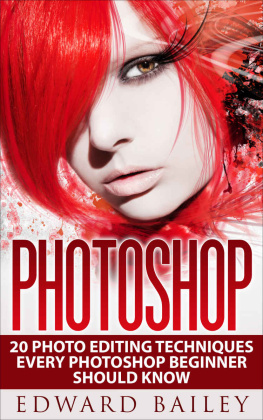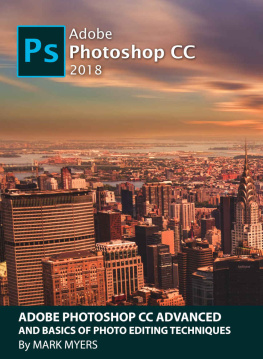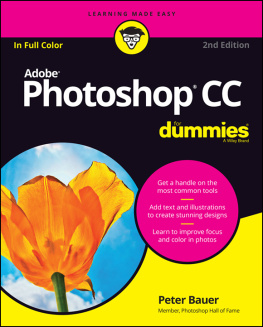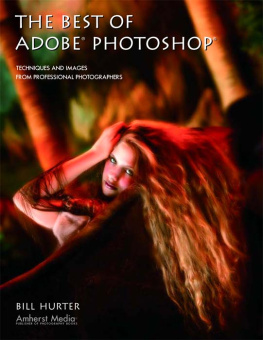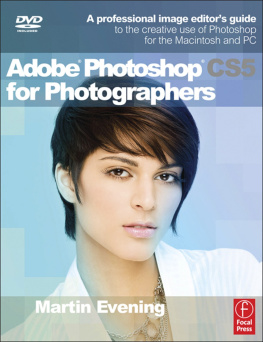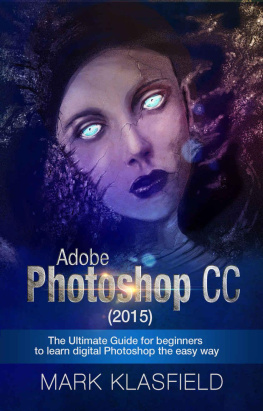Bailey - Photoshop: 20 Photo Editing Techniques Every Photoshop Beginner Should Know
Here you can read online Bailey - Photoshop: 20 Photo Editing Techniques Every Photoshop Beginner Should Know full text of the book (entire story) in english for free. Download pdf and epub, get meaning, cover and reviews about this ebook. year: 2015, genre: Home and family. Description of the work, (preface) as well as reviews are available. Best literature library LitArk.com created for fans of good reading and offers a wide selection of genres:
Romance novel
Science fiction
Adventure
Detective
Science
History
Home and family
Prose
Art
Politics
Computer
Non-fiction
Religion
Business
Children
Humor
Choose a favorite category and find really read worthwhile books. Enjoy immersion in the world of imagination, feel the emotions of the characters or learn something new for yourself, make an fascinating discovery.
- Book:Photoshop: 20 Photo Editing Techniques Every Photoshop Beginner Should Know
- Author:
- Genre:
- Year:2015
- Rating:3 / 5
- Favourites:Add to favourites
- Your mark:
- 60
- 1
- 2
- 3
- 4
- 5
Photoshop: 20 Photo Editing Techniques Every Photoshop Beginner Should Know: summary, description and annotation
We offer to read an annotation, description, summary or preface (depends on what the author of the book "Photoshop: 20 Photo Editing Techniques Every Photoshop Beginner Should Know" wrote himself). If you haven't found the necessary information about the book — write in the comments, we will try to find it.
Photoshop: 20 Photo Editing Techniques Every Photoshop Beginner Should Know — read online for free the complete book (whole text) full work
Below is the text of the book, divided by pages. System saving the place of the last page read, allows you to conveniently read the book "Photoshop: 20 Photo Editing Techniques Every Photoshop Beginner Should Know" online for free, without having to search again every time where you left off. Put a bookmark, and you can go to the page where you finished reading at any time.
Font size:
Interval:
Bookmark:
Photo Editing Techniques
EVERY PHOTOSHOP BEGINNER SHOULD KNOW
Edward Bailey Copyright 2015
All rights reserved. No part of this book may be reproduced in any form without permission in writing from the author. Reviewers may quote brief passages in reviews.
Disclaimer
No part of this publication may be reproduced or transmitted in any form or by any means, mechanical or electronic, including photocopying or recording, or by any information storage and retrieval system or transmitted by email, without permission in writing from the publisher.
While all attempts and efforts have been made to verify the information held within this publication, neither the author nor the publisher assumes any responsibility for errors, omissions, or opposing interpretations of the content herein.
This book is for entertainment purposes only. The views expressed are those of the author alone, and should not be taken as expert instruction or commands. The reader of this book is responsible for his or her own actions when it comes to reading the book.
Adherence to all applicable laws and regulations, including international, federal, state, and local governing professional licensing, business practices, advertising, and all other aspects of doing business in the US, Canada, or any other jurisdiction, is the sole responsibility of the purchaser or reader.
Neither the author nor the publisher assumes any responsibility or liability whatsoever on the behalf of the purchaser or reader of these materials.
Any received slight of any individual or organization is purely unintentional.
First and foremost, I want to thank you for downloading the book, 20 Photo Editing Techniques Every Photoshop Beginner Should Know.
In this book, you will learn how to turn ordinary every day digital photographs into picture-perfect works of art, correcting imperfections, shading, color, and even physical balance, enriching your personal journey as a budding photojournalist or digital media arts hobbyist.
Produce photographs that tell a story through the skillful use of tools for drawing, painting, retouching, selection and navigation; master simple techniques, such as cropping and resizing; introduce a new depth to your work with simple tools, such as the Magic Wand, Lasso, and Marquee to produce a whole new look, from simple to sophisticated, in the realm of digital color editing.
Thanks again for downloading this book. I hope you enjoy it!
Before You Get Started Reading
I have VERY important message that you MUST READ!
I promise You its not spam and I am not trying to sell you anything!
Now celebrating its 25 th year, Photoshop has come a long way from its beginnings in 1987 when Thomas Knoll, PhD student from the University of Michigan, started working on a computer program designed for his Macintosh computer, which included showing grayscale photographs on a monochrome monitor for his thesis on the processing of digital images. He named the program Display and it got positive reviews from Thomas brother, John Knoll. John Knoll was then connected with film industry leaders on computer graphics production, Industrial Light and Magic (ILM), and American Academy Awards winners for motion picture and visual arts.
On his brothers recommendation, Thomas took a 6-month sabbatical from his studies to develop what was to become the greatest innovation in the realm of digital color editing. The 6-month sibling collaboration and creative brainstorming yielded a full-fledged image-editing program, which was originally named ImagePro. Attempts to register the invention; however, encountered an obstacle; the name ImagePro had already been taken by another company, so Thomas renamed his baby Photoshop . Later that same year, he contracted Barneyscan, a small scanner manufacturing company, whose job was to be the distributor for 200 software copies, which already included color editing features with deliveries of their slide scanners. These features were later stripped from the first Adobe-delivered version.
While Thomas was busy writing code, back in school in Ann Arbor, Michigan, John traveled south of California to Silicon Valley, the leading hub of giant high-tech corporations and silicon chip innovators, for the purpose of introducing the program. He conducted product demonstrations to Russell Brown, who held a function of Adobes art director, and to Apple company engineers, which were both a success. Brown did not waste even half a breath; Adobe turned around and bought the distribution license in September 1988. In February 1990, the first version of Photoshop 1.0 was designed for Macintosh. With each new Adobe version, improved color handling features swiftly evolved, with innovations incorporated into the program. Photoshop was quickly catapulted to fame and became known as the gold standard in the digital color editing industry.
Now, Photoshop enjoys an almost exclusive popularity in color editing, changing in part of speech, and has become a neologism.
- Adobe Photoshop - the program (noun)
- That image needs to be photoshopped before release. (verb)
- Please do not pass any photoshopped images for your assignment. (adjective)
Even with these, Photoshop demonstrates its versatility and more so in color image editing.
Chapter 2: PHOTOSHOP THROUGH THE YEARS
Photoshops schematic nomenclature was initially numerical, meaning it was based on numbers. Before the advent of Creative Suite (CS) Branding in October 2003, Adobe put out a total of thirteen (13) versions with major and minor adjustments.












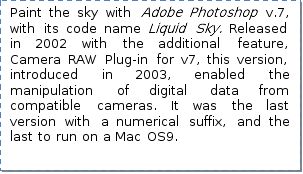
Font size:
Interval:
Bookmark:
Similar books «Photoshop: 20 Photo Editing Techniques Every Photoshop Beginner Should Know»
Look at similar books to Photoshop: 20 Photo Editing Techniques Every Photoshop Beginner Should Know. We have selected literature similar in name and meaning in the hope of providing readers with more options to find new, interesting, not yet read works.
Discussion, reviews of the book Photoshop: 20 Photo Editing Techniques Every Photoshop Beginner Should Know and just readers' own opinions. Leave your comments, write what you think about the work, its meaning or the main characters. Specify what exactly you liked and what you didn't like, and why you think so.

